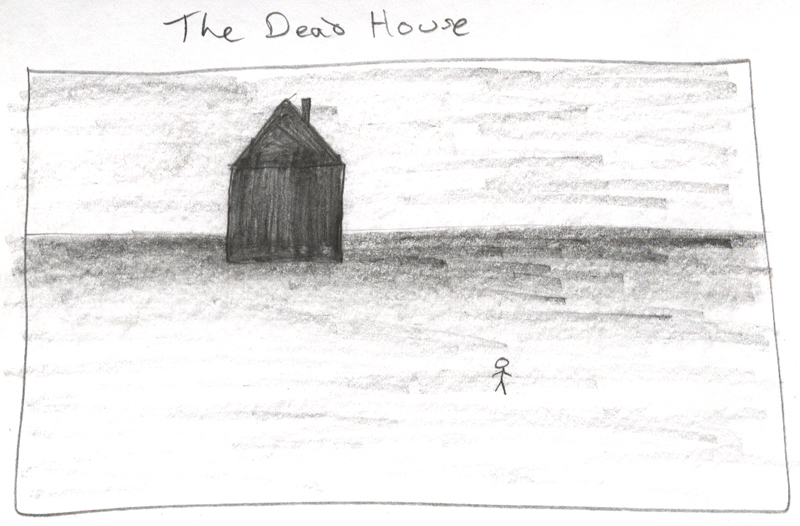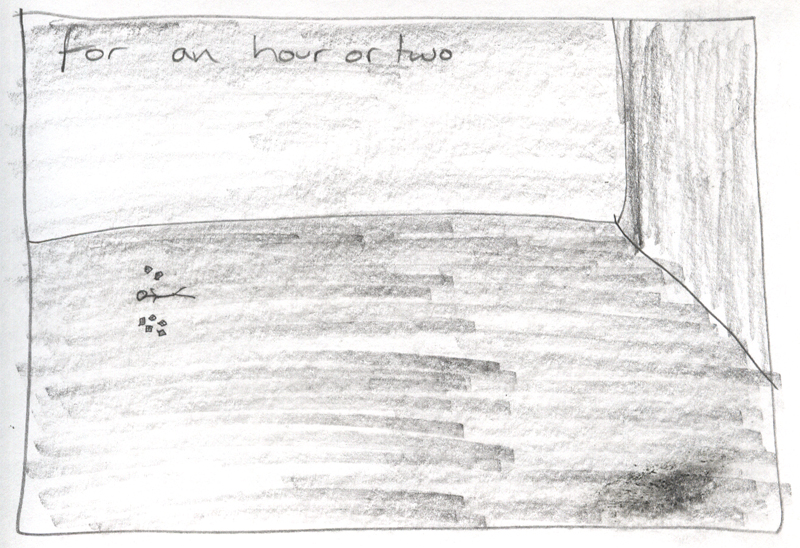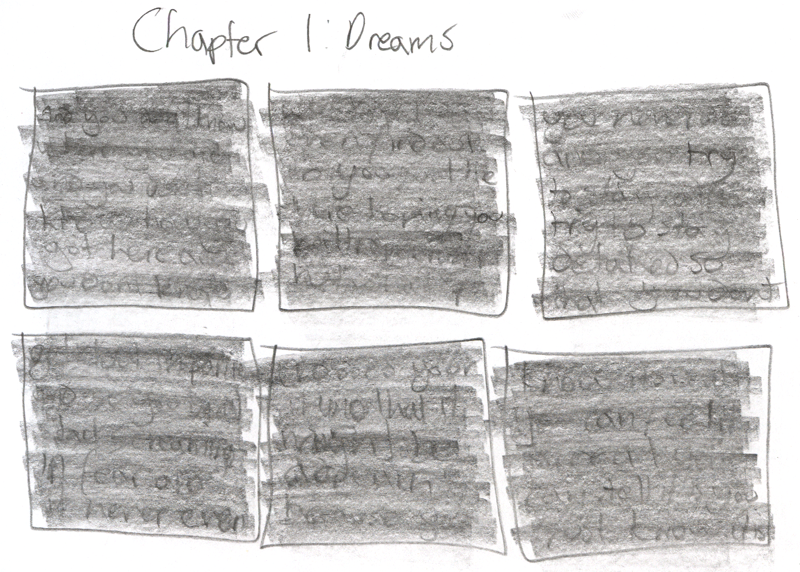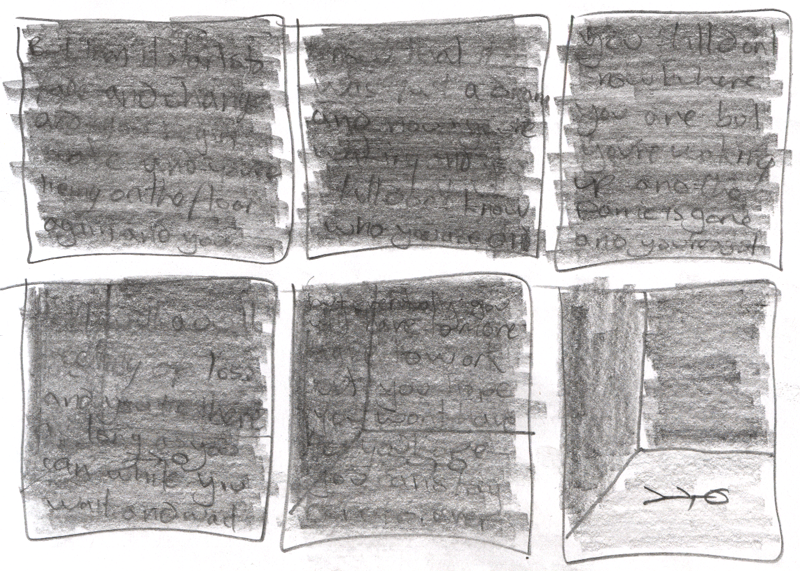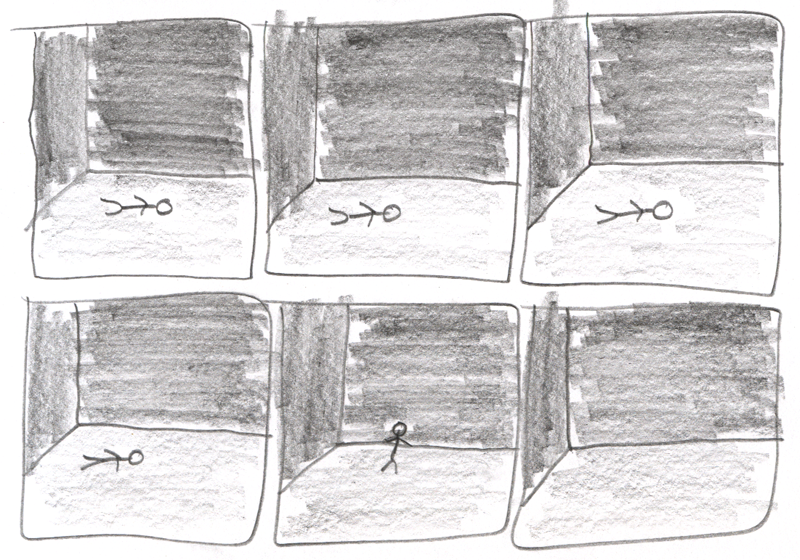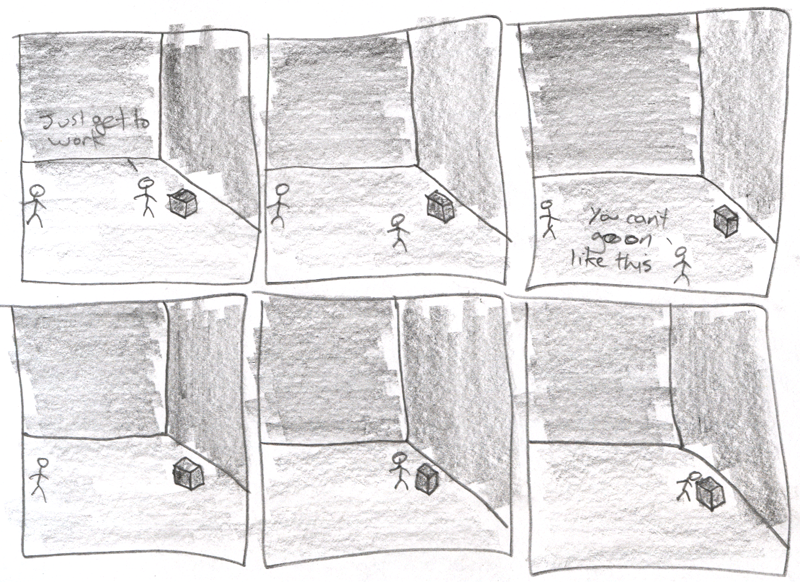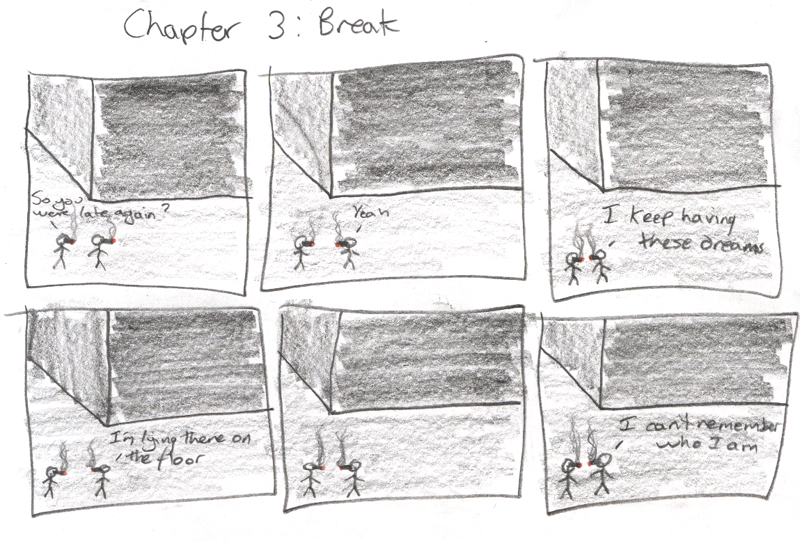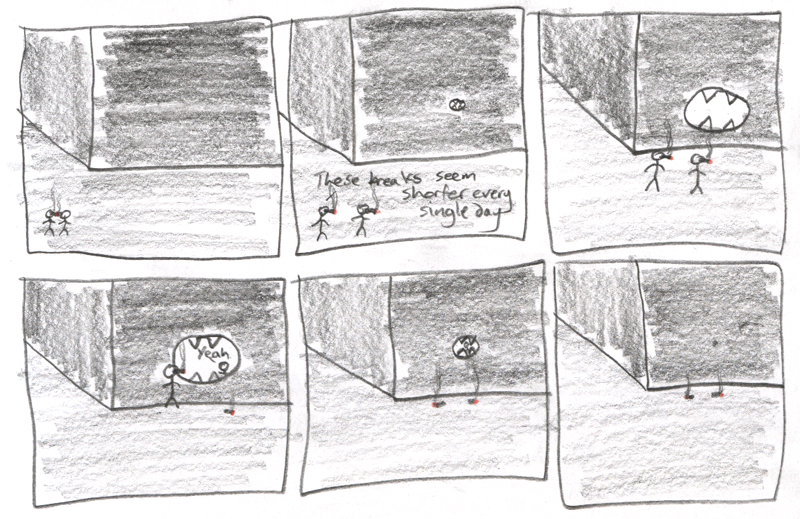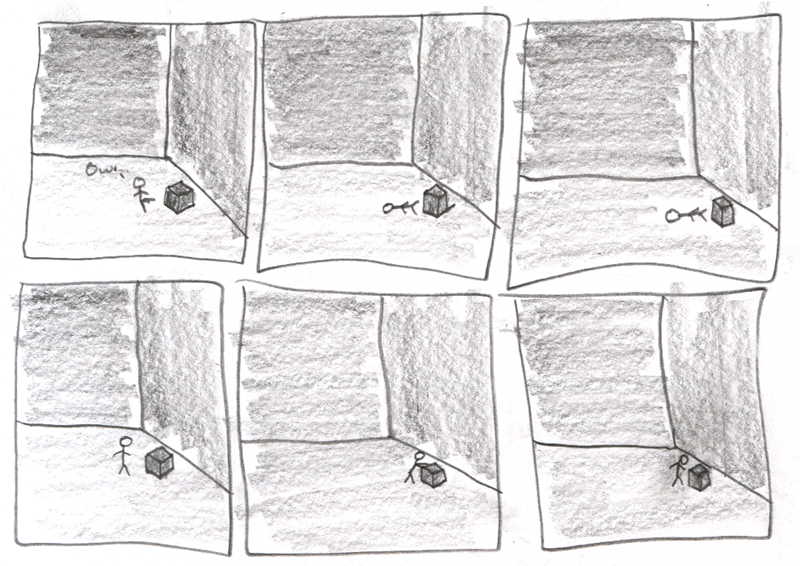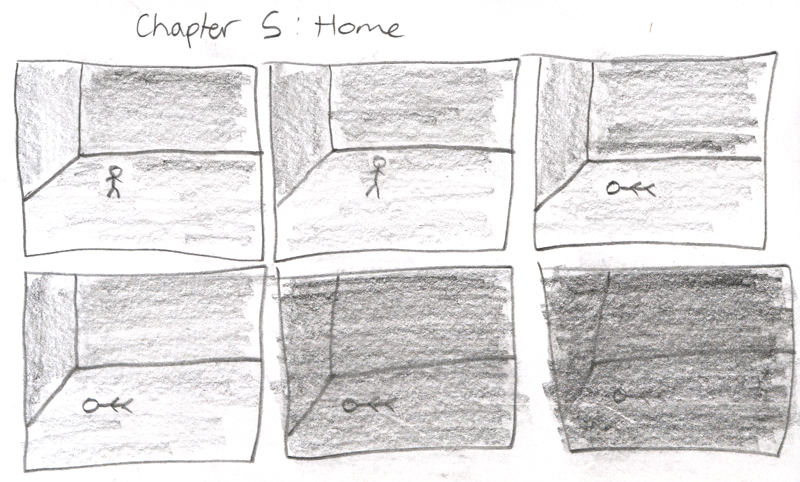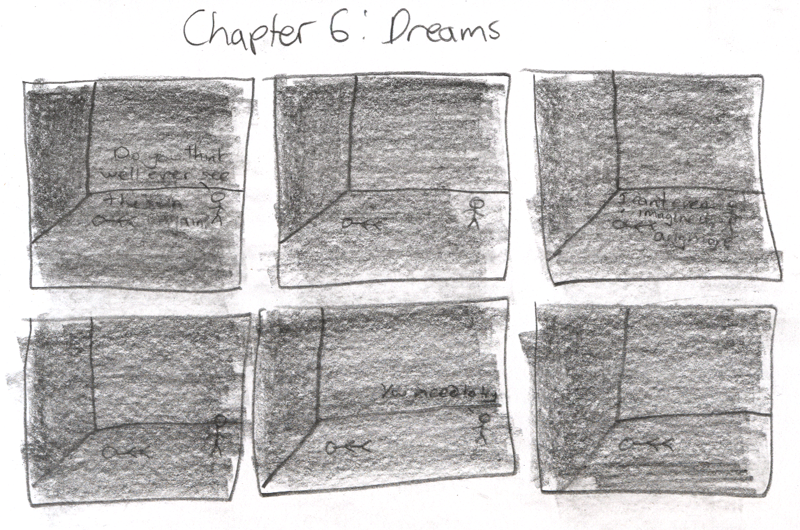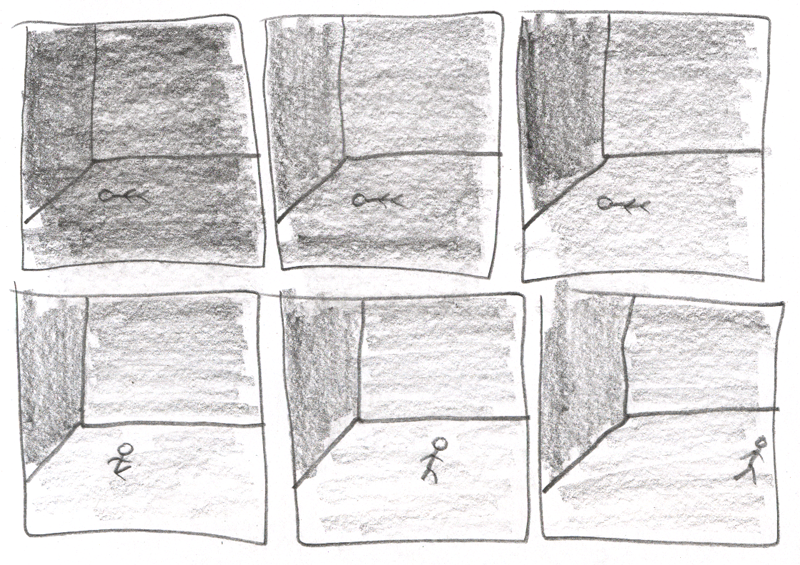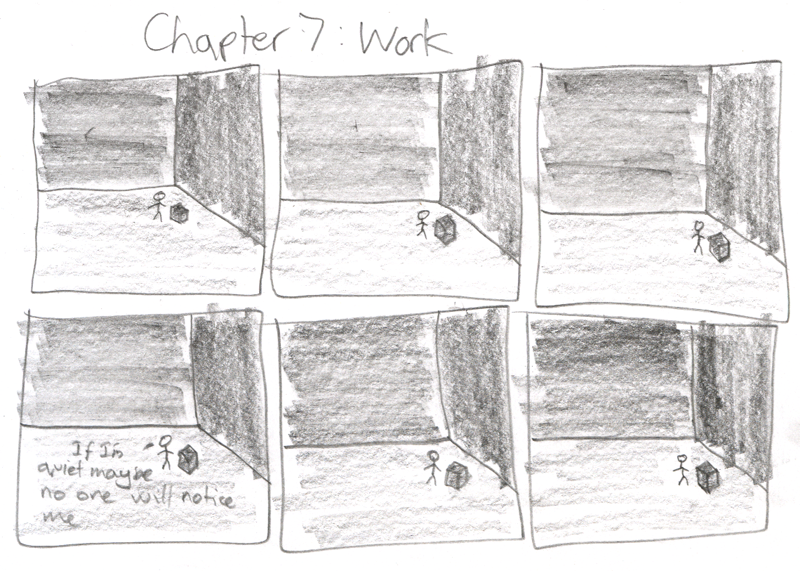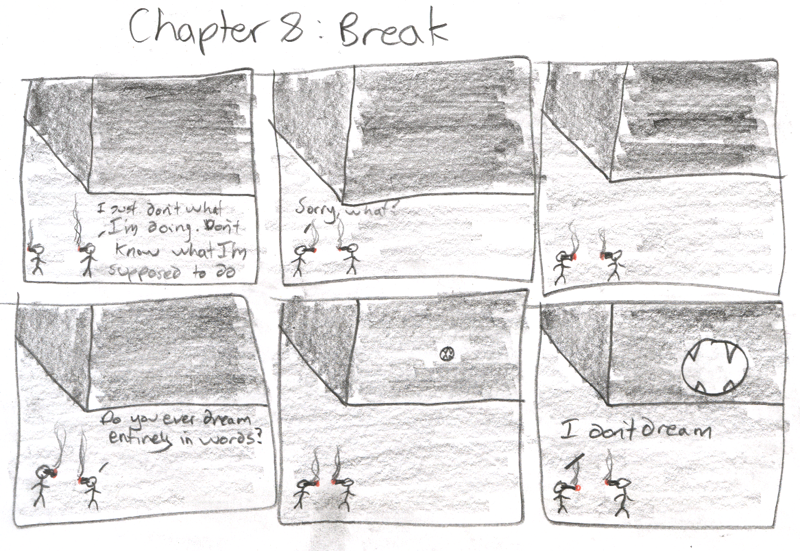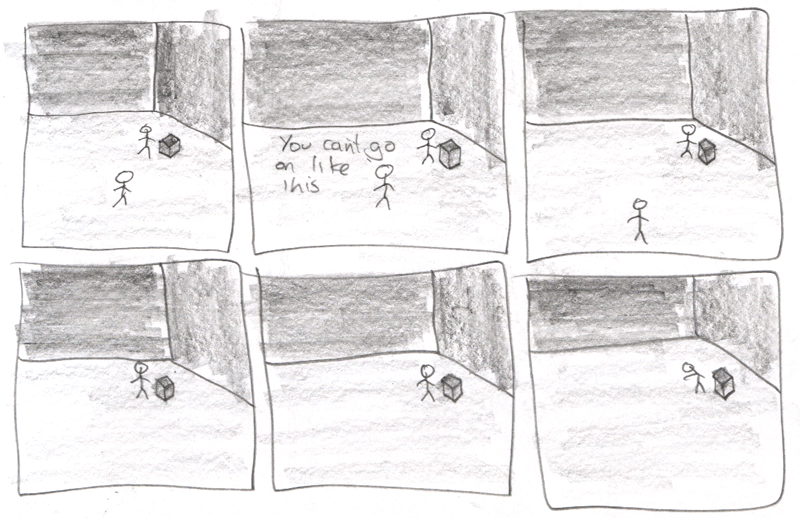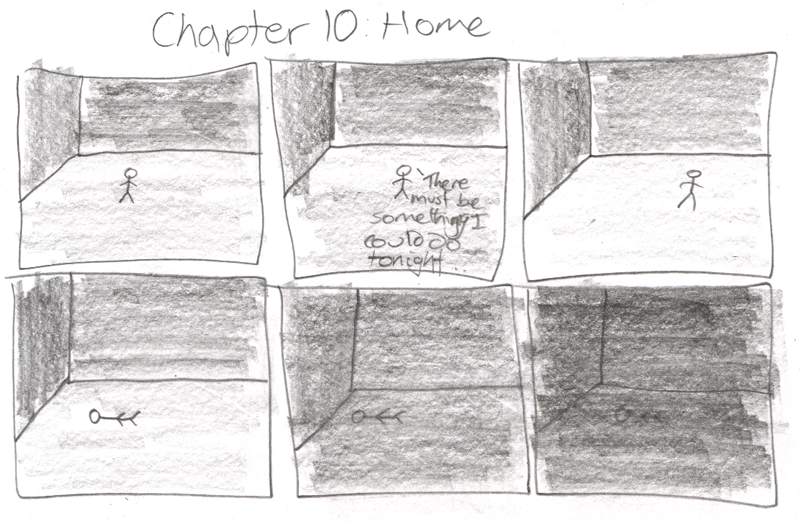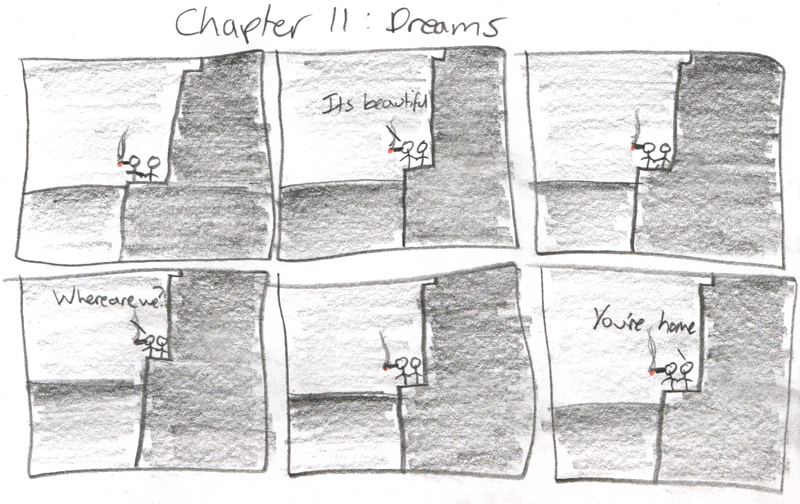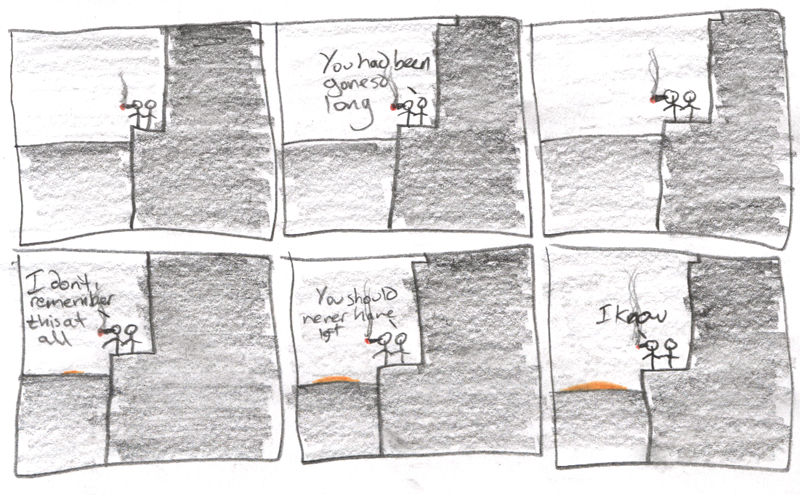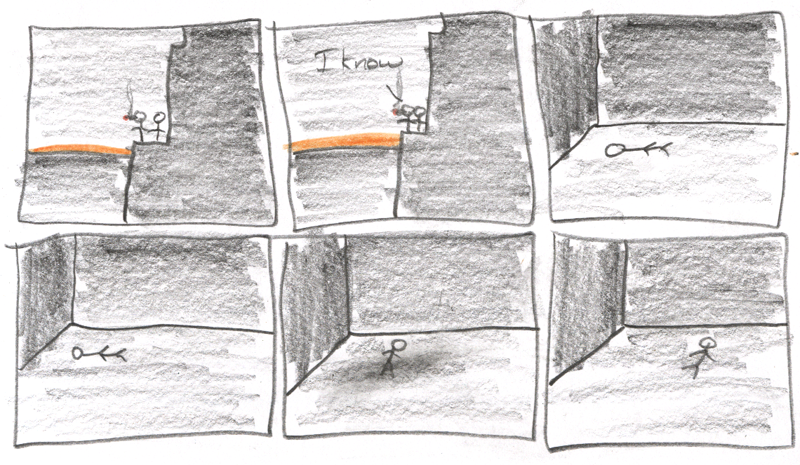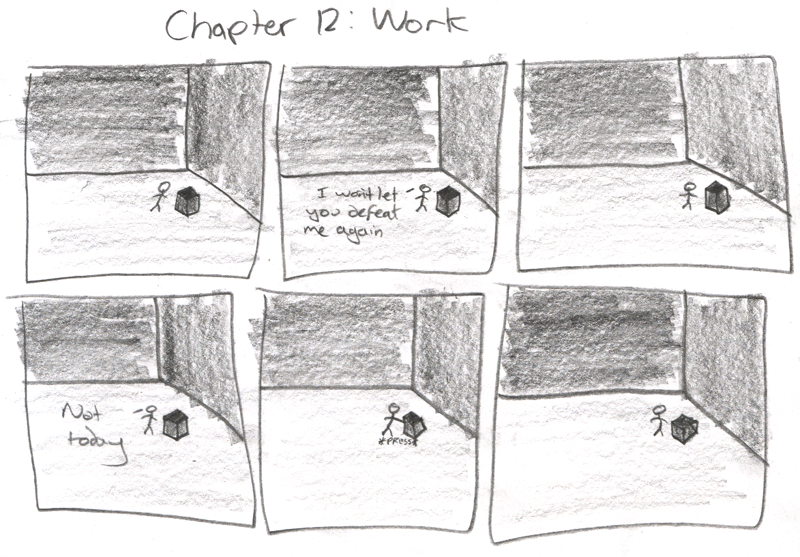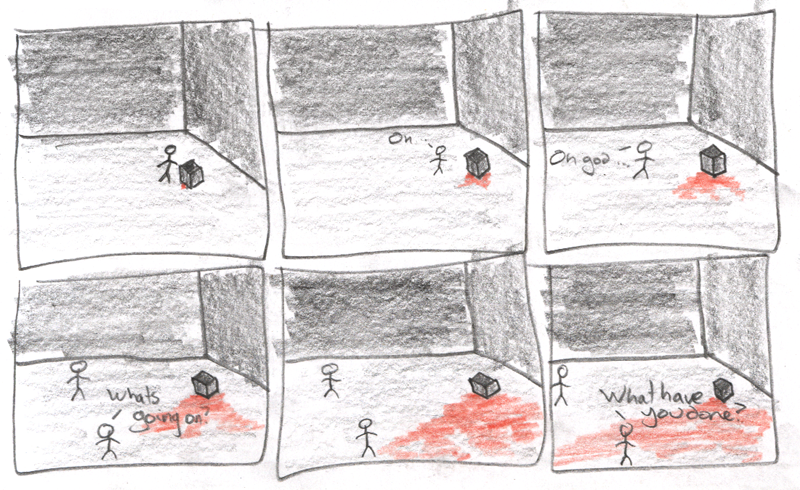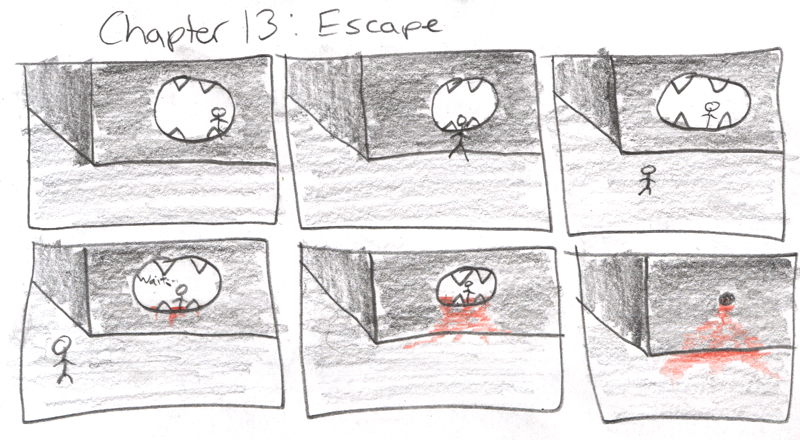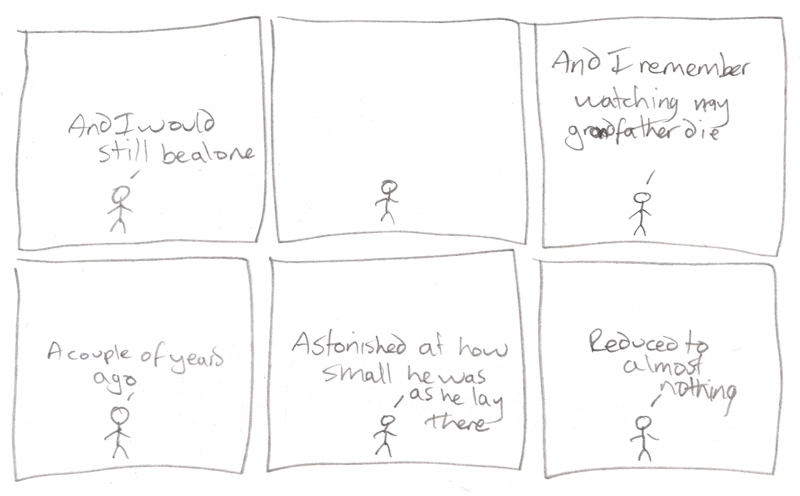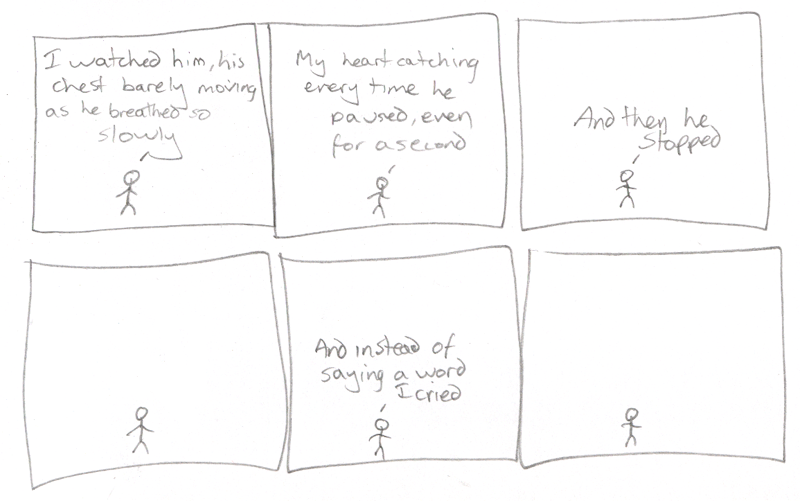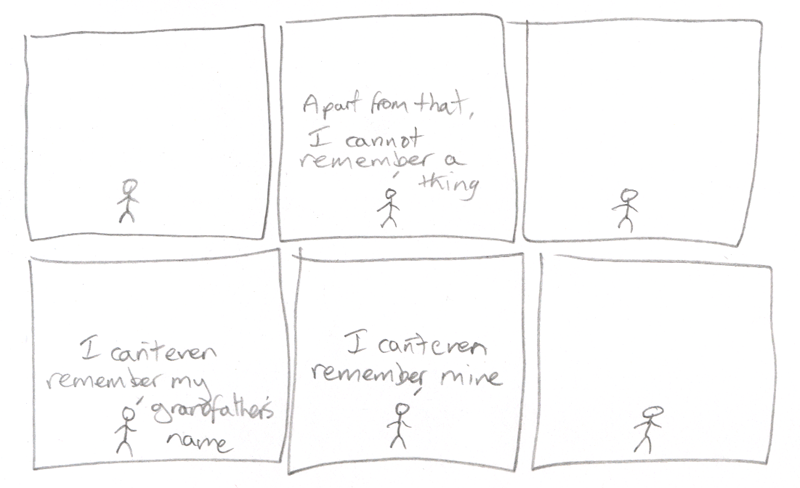The First Tale: The Lonely Prince
There lived a prince alone in his castle. A war had killed his father the king, and he had no-one who loved him enough to help him stop his grief from becoming fury.
And so in retaliation, the prince ordered his enemy’s lands be destroyed, their castles razed, their fields burnt and salted, their king’s treasures stolen, his wives butchered, his daughter kidnapped, all so the king of that land was left with nothing but grief. And once that king himself died there was nothing left at all, for all trace of his people’s civilisation had been burnt to ash in the prince’s retribution, and all memory of their culture was lost in their graves.
Only the king’s daughter survived. The prince locked the stolen child in his deepest dungeon and left her there until he could forgive her father enough to let her go. Yet in time, it was not forgiveness he found in his heart but forgetfulness. And he turned his thoughts to other things, and left her in the dark alone.
The prince grew up, and on his 21st birthday he was made king. He chose for himself a bride, and she became his queen. He loved her with all his heart, with all the love he would have given his father had he known him more, and his mother too, had he known her at all.
When his queen died giving birth to their son, he was heartbroken. When, in the subsequent days, his son, too, died, he was distraught, and now his grief was so great he locked himself in his castle and would not come out. All alone he grew old, in silence and in solitude.
His kingdom was ruled in his absence by his old advisors. Without the king’s word, they could not authorise war, and instead were forced to maintain peace and good relations with all the countries they knew. So while the king grew old in solitude and sadness, his kingdom flourished, and the people proclaimed him as the greatest monarch in their history.
And in their prosperity they forgot his war, forgot not only his crimes, but the crimes of their country.
The Second Tale: The Girl Who Learned
The king kept the child in a cage and kept the cage covered with a heavy ashen blanket, and he locked it up in a windowless room deep beneath the castle and left it there forever.
Years later, when the king had forgotten all about his captive, and left the administration of his kingdom to the hands of others, the room and its contents were discovered by a clerk busy documenting the treasures and riches of the realm.
From there gossip and rumour spread far enough and quick enough that people would, if they had the societal standing, or at least the funds to compensate for their lack of it, make a request to the king’s treasurers to be allowed to see the child.
It must be said, however, that such requests grew less frequent with every passing year. Captives, no matter how exotic, no matter how rare, all lose their allure after awhile, no matter the extravagance of their tricks. Especially when they resolutely refuse to perform for their guests.
***
The child in the cage had been found in the forest, they said, left behind by the fair folk there at the passing of the midsummer sun.
Or, they said, the child had been a gift from the gods.
The child was a traveller, the child was a spy, a thief, a lie. The child was a warning. A warrior. A weapon.
The child was an offering. The child was a beast.
But the child in the cage was none of these things.
The child was a child.
And the story everyone had forgotten was that she had been stolen from her family in a land far away, in a war long forgotten, and brought back here as a prize for a king, a symbol of his victory, a reminder of his revenge.
But the king was afraid of her, or perhaps, ashamed, and so he locked her away and hoped to forget her and the war she reminded him of.
And for many years forget her he did. Until it was too late. Until she would never let him forget her again.
***
Alone in the dark she held no form except her own.
But in the light of others…
***
Occasionally, the covering on her cage would be lifted and, in the flickering light of the lamps in their hands, the disembodied faces of noblemen would peer in and catch a glimpse of a loved one, a lost one, a lusted after one.
And then she would recoil away from the light and become lost in shadow once more.
“She’s a shy one, alright,” the gaoler would say, by way of explanation.
It was not shyness, of course, but fear. A fear that matched their own.
After a while, the paying guests would demand another view, and the gaoler would rattle the cage with his cane, but these attempts would never coax her back to the light. Then the group would leave, muttering frustration and annoyance as they left, make claims that this was just a ruse, a cynical attempt to part them of their coin. And in their anger they would forget the faces they had seen, explain them away as a trick of the light, a trick of the mind.
She would be left alone in the dark once more.
***
No prison, no matter the precautions, can ever truly be secure. A worm, perhaps, will be brought in on muddy boots. A moth, occasionally, will follow the lamp in but fail to follow it out. Wigs carry fleas. Food, maggots.
And all of these creatures with minds of their own.
***
The worm crawled across the floor and under the edges of the blanket and through the bars of the cage and it looked at the stolen child and said, “I’m lost.”
And the girl said, “So am I.”
Then the worm said, “I don’t want to die. Not in here.”
And the girl said to him, “Nor do I.”
The girl didn’t know she was a worm now. The worm didn’t know that she was not.
***
The worm died and the girl learned sorrow.
***
From the flea she learned how to find the warmth of others. From the moth she learned how to follow the light. And from herself, in the days and months after her new friends’ deaths, she learned she was lonely.
***
The maggot crawled out of the rotten bread and looked at her.
“I’m hungry,” the maggot said.
“So am I,” said the stolen child, and together they began to feed. And, as they hollowed out the loaf, together they grew fat.
When the bread was gone, they lay down together, bloated and content. And thus sated, they grew old together and prepared for death.
Instead of dying, the maggot changed. And the girl learn that she had been changing all her life.
***
Her friend the fly died in the end, of course. Everything dies. Transformation only postpones the inevitable.
Even death, itself, is a transformation. Of course.
***
In the lonely dark again she slowly lost her form. But now she had a self.
And in the darkness she wept.
And in the darkness she planned.
And in the darkness she waited as long as it was necessary to wait.
***
And finally, one day, her chance came.
***
The blanket was lifted from the cage and the lamp held up close to the bars. The faces peered in, and for a second each saw a face peer back. A face each of them recognised, but when they later conferred none could agree on the exact identity of who it was they had seen.
The face in the cage withdrew, recoiled from the light and returned to the shadows. But not now in fear, for she had learned, day by day, a purpose.
The usual attempts to coax her back into the light failed, as they always did. Interest waned, as it always did. The blanket was lowered, the room vacated, the door locked and the stairs ascended.
If any felt a flea on their skin, they thought nothing of it. If anyone noticed a fly land upon their sleeves, they shooed it away without a second thought. If, in the flickering shadows, it seemed that the same person stood to their left as to their right, well, that must simply have been a trick of the light, or a trick of the mind. And they thought nothing more of it.
And if, as they made their way down the dark corridors away from the stolen child’s cell, there was one more moth fluttering around the flame of the gaoler’s lamp, well, who can say that they’ve ever counted moths, paid any attention to their numbers whatsoever.
As they made their way out through the secret doors into the courtyards of the king’s keep, not one of them saw a worm slip free from the grooves of one of the gaoler’s boots and bury itself in the fresh and fertile earth of the king’s gardens.
***
A teacher came into the garden with a small group of children. The teacher sat beneath a tree, and while the children picked apples from the branches just above their heads, she took a book from her bag and began to read her class a story.
The stolen child sat with them and ate an apple of her own and listened to the teacher read, and that was where she learned about stories and the powers they possessed.
She imagined her life as a story. Thought about how it had it had begun, and where, perhaps, it should end.
***
In the streets she learned about the people of the kingdom.
In the court she learned about the king.
In the library she learned about the history of kingdom. She learned about its wars, and where, perhaps, she came from.
***
From the peacocks in the king’s garden she learned the arts of allurement.
From the spiders in the bushes she learned the potency of traps.
***
At one end of the garden there was a small graveyard. The peacocks did not go there, but the ravens did, and the rooks and the crows. And so, each day, did the king.
***
From the crows she learned right from wrong.
From the rooks she learned about justice.
And from the ravens, she learned about revenge.
The Third Tale: The King In The Graveyard
There lived a king alone in his graveyard. He wandered between the graves of all those he had loved, and wept as he did so, for he loved them still. And he cared not at all for anybody that still lived, and had not so much as a smile for them.
As a king, his grief was allowed to blossom and bloom and grow endlessly huge inside him, for there was nobody within his kingdom of sufficient standing to comfort or console him, and no-one brave or kind enough to help him. So he lived on, locked away within his graveyard and within himself until he was so old and so joyless he had forgotten any other way of being.
Not even the crows kept him company, for they would hop from the gravestones when he came near and take cover in the trees and upon the tops of the walls.
One day, he caught a glimpse of a woman walking in his graveyard. He tried to approach her, but when he did she would disappear from view behind a tomb, or turn from the path and step behind a tree. Whenever he reached where it seemed she should be, he found nothing there but startled crows.
But there, ahead! Another glimpse of her. And on and on, this game of hide and seek, of glimpse and follow, deeper and deeper into his private domain.
Eventually, he tired of the hunt and ordered his guards to search the graveyard and capture the intruder. But no trace of her could be found.
This happened many times, and soon people began to wonder if the king’s grief had finally turned to madness. Not even the lonely king was so oblivious that he could fail to see the pity in his courtiers’ eyes, and so he kept quiet about the woman he still saw, day after day, in the labyrinth of his graveyard.
Now he would not call the guards when he tired of the hunt, but redouble his efforts, running from gravestone to gravestone, from tomb to tomb, hoping to get close enough to her so that he could see her face, reach out and hold her hand, speak out and ask her name.
But always as he approached she would flit away, disappear into nothing, and he would be all alone once more in his barren garden of crows and thorns.
Only in his dreams would he catch her. When she turned to face him it was his wife’s face that she wore, his wife’s smile that played across her dark red lips. And his wife’s voice that said…
But before she spoke he would wake from his reverie, lost somewhere unknown in the dense tangles of his graveyard, more alone now than ever before.
The Fourth Tale: The Woman Who Was Whatever She Wanted
A king found a woman sleeping among the flowers in his private garden. She looked just like his beloved wife, who had died many years before. And so the king let her sleep, and he watched her while she did.
When she awoke, many hours later, the king was still watching, and he said to her, “Who are you, who is sleeping in my garden?”
And she said, “I am who I want to be.”
The king said then, “Why are you here, in my private garden?”
“I am where I need to be,” she said.
Finally the king said, “And why are dressed as you are, as if for a wedding?”
And she said, “I am dressed for what I plan to happen.”
And that very night they were married.
The Fifth Tale: The Queen Who Taught
It was only in their bridal chambers that the queen was finally alone with the king. No guards watching from the shadows, no advisors taking notes of the king’s absentminded thoughts. No servants helping him get dressed, or bringing him his food. No guards waiting nervously to open a door for him as he approached, or close it once he had passed.
She thought back to the years of her captivity, and wondered at the differences in their solitudes.
“You look so much like her,” the king said, thinking of his old wife.
Then the king motioned to their bed, and said to his new wife, “I have much to teach you.”
And she said, “I have much to learn.”
***
She asked him about his family. She asked him about himself. She asked him about his country.
And finally, she asked him about hers.
***
“There are tales people tell,” she said. “Of a captive in the castle, from a long-dead kingdom by the sea.”
He looked at her in confusion. At first her words meant nothing to him. But slowly memories rose up within him.
Memories of a country he had never seen, of strange artefacts brought to him as gifts, and stranger people come to plead with him for mercy. Memories of the fury of a boy he no longer recognised as himself.
But of the stolen child he had no memories at all. If there had been a captive in the castle, he said, she had long been forgotten.
“It was all so long ago,” he said. “I was but a child.”
“So was I,” she said. And she taught him all she knew.
***
She coiled herself around his heart like the snakes had taught her, winding herself so tightly round his chest that the king could not call out to his guards for help. Every time he tried she tightened her grip, and soon he fell unconscious in her embrace.
She became an eagle as huge as any legend. In her talons she held him, and through the castle window she flew, away, away, into the sky. Up and up they flew, until the castle below was little bigger than a single letter in the great vast text of the land below.
The king awoke and she showed him the extent of his lands, and for a day and a night she flew, over farms and forests and pastures, over towns and markets and cities, and all the while the king begged for her to free him, but she would not. “You brought me to your kingdom,” she said. “So I shall take you to mine.”
Finally, as the next day’s sun rose above a great desert, she said, “This is where the kingdoms of my childhood stood.”
She dropped him down into the sand. She became a camel, and dragged the king behind her, and for a night and a day they walked and saw no sign of life among the dunes.
They came to a cliff by the edge of the sea, and she threw the king over the side and then dived down behind him, an eagle for a second, then a falcon, a gull, a gannet, and she hit the water before the king. And as the water touched her wings she became a fish, an eel, a shark, a dolphin.
Then she was a whale, bigger than any that had ever lived and as big as any that ever would. She opened her mouth and swallowed the king whole.
In the years that followed, in an ocean bigger than all the kingdoms of man combined, she taught him what it was like to live in a cage.
The Final Tale: The Women In The Woods, The Swallows In The Sky
The old kingdoms and the old tales have faded from the world. And the magic, too, many say. But there are still wild places in the world, if you know where to look. And in them more than we can ever know.
One day you’ll be out walking. You’ll catch a glimpse of a woman walking in the woods, and by her side her daughter, too.
When they see you approach, they will turn and walk unhurriedly away. And as you follow, they’ll take a turn from the path, step behind a tree, and though you hurry to catch up, by the time you’ve moved to look they’ll have disappeared from view.
You’ll see two rabbits running away across the field, tails bobbing in the twilight. Or two swallows taking to the sky, flying away on oh so delicate wings. Or you’ll see two otters swimming down the river, under the bridge and away. Away from sight and away from you and away from the world they need no part of.
You’ll never see these women again. Yet you’ll never forget.
And, O, the tales they could tell.
__________
Notes
1. Written between July 2016 and August 2018
__________
If you like the things you've read here please consider subscribing to my patreon or my ko-fi. Patreon subscribers get not just early access to content and also the occasional gift, but also my eternal gratitude. Which I'm not sure is very useful, but is certainly very real.(Ko-fi contributors probably only get the gratitude I'm afraid, but please get in touch if you want more). Thank you!
